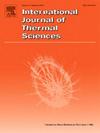Transient thermal characteristics of silicon microchannel flow boiling
IF 4.9
2区 工程技术
Q1 ENGINEERING, MECHANICAL
International Journal of Thermal Sciences
Pub Date : 2025-01-09
DOI:10.1016/j.ijthermalsci.2025.109679
引用次数: 0
Abstract
Microchannel flow boiling with excellent heat dissipation capability is widely applied to thermal management of various high-power density thermal systems. Previously, microchannel flow boiling has been thoroughly studied under constant heat loads. However, in practical applications, the thermal components usually suffer from dynamic input power, resulting in significant fluctuation of working temperature. Hence, the research of transient behaviors of flow boiling is very important, particularly for dynamic heat loads. In this study, systematic experiments were carried out to understand transient thermal responses of microchannel configuration with auxiliary channels and multiple micronozzles, which was previously investigated under steady state condition and significant enhancements were reported. Here, transient wall temperature and overall heat transfer coefficient (HTC) were presented under pulse heating. The impact of heating pulse on flow boiling and two-phase flow regimes was investigated. Additionally, visualizations were synchronized with flow boiling heat transfer characteristics. Comprehensive comparisons were presented to elucidate the effect of this configuration in enhancement of flow boiling performance. Noticeably, the transient HTC was significantly increased by ∼225 % in contrary to plain wall microchannel at 380 kg/m2s.
求助全文
约1分钟内获得全文
求助全文
来源期刊

International Journal of Thermal Sciences
工程技术-工程:机械
CiteScore
8.10
自引率
11.10%
发文量
531
审稿时长
55 days
期刊介绍:
The International Journal of Thermal Sciences is a journal devoted to the publication of fundamental studies on the physics of transfer processes in general, with an emphasis on thermal aspects and also applied research on various processes, energy systems and the environment. Articles are published in English and French, and are subject to peer review.
The fundamental subjects considered within the scope of the journal are:
* Heat and relevant mass transfer at all scales (nano, micro and macro) and in all types of material (heterogeneous, composites, biological,...) and fluid flow
* Forced, natural or mixed convection in reactive or non-reactive media
* Single or multi–phase fluid flow with or without phase change
* Near–and far–field radiative heat transfer
* Combined modes of heat transfer in complex systems (for example, plasmas, biological, geological,...)
* Multiscale modelling
The applied research topics include:
* Heat exchangers, heat pipes, cooling processes
* Transport phenomena taking place in industrial processes (chemical, food and agricultural, metallurgical, space and aeronautical, automobile industries)
* Nano–and micro–technology for energy, space, biosystems and devices
* Heat transport analysis in advanced systems
* Impact of energy–related processes on environment, and emerging energy systems
The study of thermophysical properties of materials and fluids, thermal measurement techniques, inverse methods, and the developments of experimental methods are within the scope of the International Journal of Thermal Sciences which also covers the modelling, and numerical methods applied to thermal transfer.
 求助内容:
求助内容: 应助结果提醒方式:
应助结果提醒方式:


